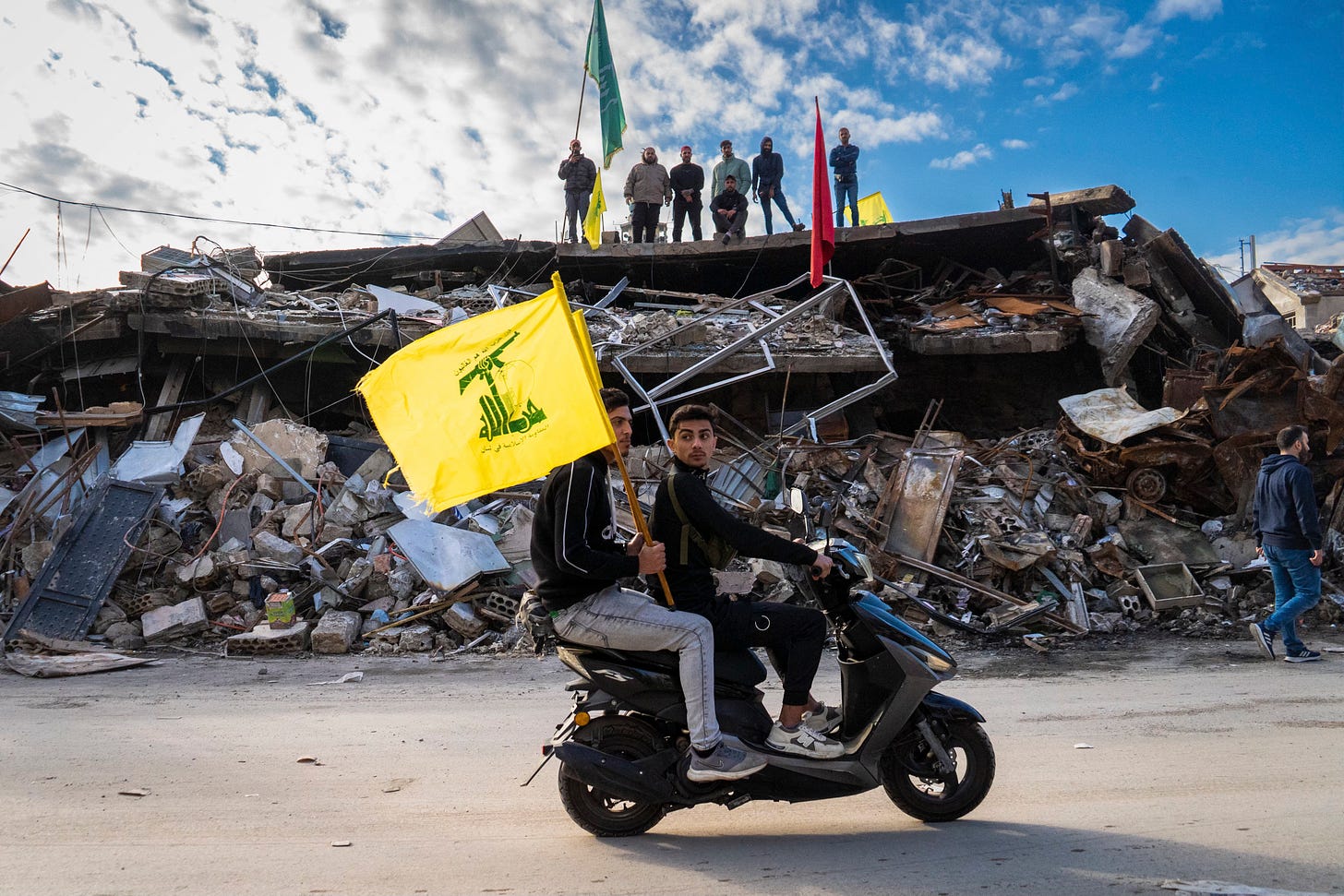The Destruction of Hezbollah Is an Opportunity for Lebanon
With the instrument of outside influence in ruins, Lebanese democracy gets another shot.

AS FAR-FETCHED AS IT MIGHT SEEM TODAY, Lebanon was once regarded as the Switzerland of the Middle East: small, multi-confessional, polyglot, picturesque. But Lebanon never approached the drab stability for which Switzerland is universally known. And the feebleness of the Lebanese state prevented it from mimicking Switzerland’s famed neutrality. A weak nation, as Alexander Hamilton pointed out, forfeits even the privilege of being neutral.
But there was a time when Lebanon was at peace with itself and at home in the modern world. The specter of violence, from within or without, was just a specter. Lebanon’s culture featured pluralism and consensual politics, which grew out of its unique status as a Levantine country without a religious majority. The composition of various confessions and communities had bred a fragile but tangible equilibrium that allowed for a modicum of liberalism, especially in cosmopolitan Beirut. It stood out in the Middle East.
Lebanon lost that precious inheritance because of its inability to forge a strong state. So Lebanon has become the place where the Middle East fights its wars—a battleground not only for its own sects and their various factions, but a battleground in the Arab-Israeli conflict and now in the Iranian-Israeli conflict.
The Palestinian Liberation Organization brought conflict to Lebanon when the organization moved there in 1975, helping spark fifteen years of civil war, which eventually included portions of Lebanon being occupied by Syria and Israel. As for involving Lebanon in the Israeli-Iranian conflict, the responsibility rests with Hezbollah. A joint venture of the late and unlamented Assad dynasty and the Islamic Republic of Iran, it has been the primary obstacle to Lebanese peace and prosperity. Besides warring against other Lebanese factions, it has waged an endless war against the “Zionist entity.”
This is not the first time the Shia militia has embroiled Lebanon in conflict. In 2005, fifteen years after the end of the civil war, Syrian troops still occupied large portions of Lebanon and Syrian interests still dominated the government. The assassination of Prime Minster Rafic Hariri by Hezbollah spawned the Cedar Revolution, a cascade of nonviolent protests against Syrian influence. The protests had some effect—the government resigned and there were general elections, but Hezbollah continued to operate as an arm of Syrian and Iranian influence both inside and outside the formal government. Hezbollah and its foreign patrons had been desperate to stymie any reforms that might compel its disarmament and wanted to turn the tables on the leaders of the Cedar revolution. In July 2006, Hezbollah operatives crossed the Israeli border and kidnapped two IDF soldiers, precipitating a brief but lethal skirmish that left swathes of Lebanon devastated.
During that war, former Hezbollah Secretary General Hassan Nasrallah unashamedly stated that he was going to fight against Israel “whether the Lebanese wanted it or not.” His fanatical belligerence toward the Jewish state was hardly a secret. But this assertion laid bare Nasrallah’s utter contempt for democratic principles. Vast tracts of Lebanon had been smashed by Israeli airpower, but this didn’t stop Nasrallah declaring a “divine victory” when the guns fell silent.
Since its inception as a joint venture between Iran and Syria, Hezbollah’s chief purpose has not been to uplift its Shia brethren, the traditional underclass in Lebanon’s polyglot ethnic makeup. It had more grandiose ambitions. Under Nasrallah’s leadership, it became the most powerful non-governmental entity in the Middle East, the vanguard force advancing the Iranian revolution in the Levant. It challenged the institutions of the Lebanese state as well as to its open, pluralistic culture. Initially, Iran’s Revolutionary Guards had trained Hezbollah to wage war against Israel, but it soon developed into a gang that launched suicide attacks and hunted down every Westerner it could find—including many Americans. Espousing a culture of death, it has brooked no dissent and employed extreme violence against domestic critics and foreign enemies alike.
Before this year’s setbacks, Hezbollah’s greatest feat had been to push the Lebanese state into adopting what Nasrallah used to call a “defense strategy.” His idea had been to place “resistance” against Israel and ultimately the United States at the heart of the state’s concerns. While remaining almost wholly subservient to its foreign masters, it sought to transform Lebanon into “a state of resistance” with Hezbollah acting as the tip of the spear. In solidarity with its cousin “resistance” organization, Hamas, Hezbollah launched a flurry of rockets against the Israel immediately after October 7th, and its missile fire has continued ever since.
Since the Israeli invasion of southern Lebanon in October, Hezbollah has suffered immense, perhaps irreversible damage. A series of Israeli maneuvers—beginning with the detonation of Hezbollah’s communication devices, which maimed its middle ranks while throwing the group into disarray, and following up with targeted strikes against its senior commanders, including Nasrallah—has eviscerated its entire organizational structure.
Israel has also attacked branches of a Hezbollah-linked bank as part of a wider campaign to degrade the social and economic institutions that Hezbollah relies upon to wield influence over the fractured society. While thousands of Israeli troops hunted and destroyed Hezbollah infrastructure along the border, Israeli airpower has begun to pound Baalbek in the Bekaa Valley, where the group was founded and retains a key stronghold.
Whenever the shooting ends, Nasrallah won’t be around to bluster and strut. On paper, Hezbollah will undoubtedly remain the Mediterranean branch of Iran’s Revolutionary Guard Corps. What it will be in reality is another matter. As Lebanon pays the price for what might prove to be Hezbollah’s final war, it behooves observers in Beirut and beyond to render a candid assessment of what the Party of God has wrought.
Hezbollah will doubtless continue to present itself as a Lebanese resistance force. No one should fall for that fiction. The grim truth about Hezbollah, as Bret Stephens has observed, is that it is an Iranian occupation force. With Hezbollah brought low, perhaps the promise of the Cedar Revolution can finally be fulfilled and Lebanon can finally achieve true independence.
The terms of the recent cease-fire between Israel and Hezbollah make it plain that Israel triumphed over the “axis of resistance” in the Third Lebanon War. Hezbollah’s Radwan special forces have been devastated and, according to the late-November ceasefire agreement, remnants of those units will be targeted if they continue to operate rocket sites and harass the Galilee. The Lebanese Armed Forces have begun to deploy 10,000 soldiers to the border zone to keep peace on its side while Hezbollah has pledged to fall back north of the Litani River (as per UN Resolution 1701). But the LAF, which has received more than $3 billion from the United States since 2006, is a weak force plagued by chronic underfunding and inadequate training. Without a boost in foreign support, it may not be able to fulfill the terms of the ceasefire.
Many years ago, Walid Jumblatt, the Lebanese Druze leader, disputed that Nasrallah could lay claim to being Lebanese on account of his foreign ideology and his foreign paymasters. Nasrallah “is not Lebanese because he receives his orders from the Syrian regime and the [Islamic] Republic of Iran.” The perceptive Druze leader refused to grant that Nasrallah—who had spent his formative years between Iran and Iraq—even knew the culture of Lebanon, which embodied “hope, love, and life.” In pointed contrast, the zaim (or chief, as Nasrallah was known) had imbibed “the culture of martyrdom, which in the final analysis means the culture of sorrow, misery, and death.”
Today, Hezbollah is a shadow of its former self, with scant options to regenerate anytime soon. After its senior leadership was cut down, the subsequent fall of the Assad dynasty has deprived Iran of its corridor to the Mediterranean. As a result, the Lebanese have been afforded a rare chance to corral Hezbollah and restore their sovereignty after decades of de facto foreign occupation.
Although this new order has given hope for the Lebanese to reclaim and affirm the culture of life, it will also generate renewed fear about a descent into yet another civil war. But now that the state is no longer compelled to bow and scrape before Hezbollah and its foreign backers, it has a chance, at last, to fulfill the needs of its own citizens. If only they, aided by their foreign friends, can seize it.





